
No, Wait. Yep. Definitely Still Hate Myself.
Robert Fitterman
Natalya Lobanova, Illustrator
March 2014
A consistent protest against suffering.
David Kaufmann
Robert Fitterman’s new book-length poem borrows its poetic form, loosely, from James Schuyler’s The Morning of the Poem, to orchestrate hundreds of found articulations of sadness and loneliness from blogs and online posts. A collective subjectivity composed through the avatar of a singular speaker emerges. But the real protagonist of No, Wait. Yep. Definitely Still Hate Myself. is subjectivity as a mediated construct—the steady steam of personal articulations that we have access to are personal articulations themselves already mediated via song lyrics, advertising, or even broadcasters. No, Wait… blurs the boundary between collective articulation and personal speech, while underscoring the ways in which poetic form participates in the mediation of intimate expression.
This book is now in its second printing, with letterpress covers printed at UDP.
About the Author
Robert Fitterman is the author of 15 books of poetry including This Window Makes Me Feel (UDP, 2018), Nevermind (Wonder Books, 2016), Rob’s Word Shop (UDP, forthcoming, 2018), No Wait, Yep. Definitely Still Hate Myself (UDP, 2014), Holocaust Museum (Counterpath, 2013, and Veer [London] 2012), now we are friends (Truck Books, 2010), Rob the Plagiarist (Roof Books, 2009), war, the musical (Subpress, 2006), and Metropolis—a long poem in 4 separate volumes, and is the co-author of Notes on Conceptualisms (UDP, 2009). He has collaborated with several visual artists, including Serkan Ozkaya, Nayland Blake, Fia Backström, Tim Davis and Klaus Killisch, and is the founding member of the international artists and writers collective, Collective Task. He teaches at New York University and is a member of the writing faculty of the Milton Avery School of the Arts at Bard College.
Praise
The better part of Rob Fitterman’s more recent work—and here I am particularly thinking of SPRAWL, PILLBOX and NOW WE ARE FRIENDS—concentrates on public performances of privacy. Fitterman has always mistrusted the ideology of lyric sincerity and he has a healthy disdain for all forms of prefabricated affect. But his well-earned cynicism is tempered by a countervailing sense that unoriginal language can indeed express heartfelt, if barely articulate and articulated experience. So underneath his source texts’ self-dramatizations and clichéd self-pity you can hear echoes, however faint, of real pain. While it is, therefore, hard not to read his work as an attack on commodified subjectivity as well as on a debased poetry of emotional authenticity, it is also hard not to detect in his poetry a consistent protest against suffering.
David Kaufmann
Fitterman’s works constitute an anti-nostalgic and timely re-iteration of appropriation strategies and engagement in modes of radical mimesis that critically examine capitalism under digital culture, mounting an agenda of changing the distribution of the sensible not by making the invisible visible but by proposing counter-reading to ambient distraction and ever-more insidious textual instrumentalities in a culture saturated with marketing and deluged by information…
Judith Goldman, Postmodern Culture
Fitterman isn’t just bringing the avatar voice offline, he’s nominating it as a poetic voice and what it says as poetry, whether anyone likes it or not.
Nick Thurston, BOMB
No, Wait… is able to craft complex moments out of the original blog or post text that turn outward expressions into much keener inner struggles.
Douglas Luman, The Found Poetry Review
About the Contributor
Natalya Lobanova has been publishing her artwork online since 2010. This has led to solo exhibitions in Knoxville, Tennessee and Tampico, Mexico, as well as participation in numerous group exhibitions in London and Copenhagen. She has also provided illustrations for numerous online and print publications. She is currently a student of Philosophy and Politics at the University of Edinburgh.
In the News
Links
Other UDP titles from Robert Fitterman here
Publication Details
ISBN: 978-1-937027-32-2
Trade Paperback
Perfect-bound. 88 pp, 5.75 x 7.75 in
Publication Date: March 01 2014
Distribution: Inpress Books (UK), SPD